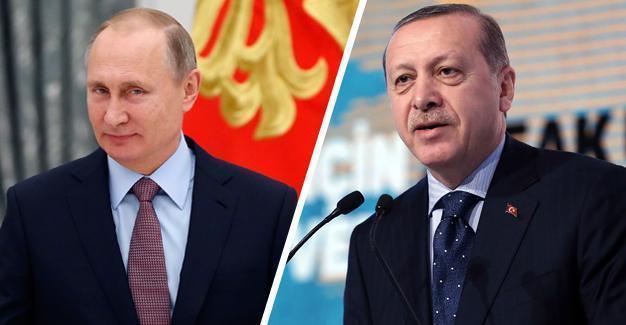Erdoğan and Putin in intense talks after attack on Turkish troops in Syria
ANKARA
 Turkish President Recep Tayyip Erdoğan and his Russian counterpart, Vladimir Putin, have engaged in intense talks a few days after a fatal attack on Turkish troops in Syria.
Turkish President Recep Tayyip Erdoğan and his Russian counterpart, Vladimir Putin, have engaged in intense talks a few days after a fatal attack on Turkish troops in Syria. The two leaders talked about the recent developments in war-torn Syria and efforts to find a solution to the humanitarian crisis in the Syrian city of Aleppo, according to a presidential source, who spoke to state-run Anadolu Agency on condition of anonymity due to restrictions on talking to the media.
This phone conversation came one day after Erdoğan and Putin spoke over the phone on Nov. 25 to discuss bilateral and regional issues.
A number of issues topped the conversation then as well, including an attack on Turkish soldiers near al-Bab in northern Syria.
Four Turkish soldiers were killed and nine others were wounded in an air strike “thought to have been carried” out by Syrian government forces early on Nov. 24, the first anniversary of Turkey’s downing of a Russian jet along the border with Syria, the Turkish Armed Forces announced on Nov. 24.
Ankara spoke with the Russian military to probe the strike targeting Turkish troops, sources told daily Hürriyet on Nov. 25.
While the attack prompted initial suspicions of an attempt to bring Turkey and Russia face to face again in Syria, one year after the jet incident that severely harmed the relations between the two, Russia adopted a cooperative attitude and assured Turkey via communication channels established as part of recent rapprochement initiatives that the strike was not carried out by them, sources said.
Meanwhile, Turkish Deputy Prime Minister Numan Kurtulmuş told Reuters on Nov. 26 that Turkey’s rapprochement with Russia has not changed Ankara’s position that Syrian President Bashar al-Assad must go to restore peace in the country.
“We are in the same position, al-Assad has committed war crimes several times,” Kurtulmuş told Reuters. “We have of course with Russia some differences in our opinions for the future of Syria, but we see the Russian side much more willing to encourage the regime for a peaceful solution.”
Russia and Iran have provided direct military support to al-Assad while countries that want to see him gone from power, including the United States, Saudi Arabia, Qatar and Turkey, have done the same for the rebels fighting his forces.
The topics discussed between Erdoğan and Putin also included the current humanitarian situation in Aleppo.
Hundreds of civilians have fled rebel-held east Aleppo after government forces, determined to retake all of Syria’s second city, seized its largest opposition-controlled district, AFP reported.
The capture on Nov. 26 of Masaken Hanano – which had been the biggest rebel-held district of Aleppo – was a major breakthrough in a 13-day regime offensive to retake the entire city.
The fighting moved to two neighboring districts, Haidariya and Sakhur, on Nov. 27, with government aircraft pounding rebel positions and heavy fighting between the opposition and forces loyal to al-Assad.
Masaken Hanano was the first district the rebels took in the summer of 2012 in a move that divided the city into a rebel-held east and a government-controlled west.
On Nov. 27, a blast ripped through a street in the northern Syrian town of al-Rai in what was believed to be an Islamic State of Iraq and the Levant (ISIL) suicide bombing and 12 wounded, mostly children, were brought to a hospital in nearby Turkey, security and hospital sources said.
Turkey’s army earlier in the day said ISIL militants fired a rocket into the Khaliliye area of the same region that caused symptoms of “chemical gas” exposure in 22 Free Syrian Army (FSA) rebels.
Turkey’s emergency agency AFAD said later in the day that no traces of chemical attacks were spotted in the 22 wounded FSA rebels, state-run Anadolu Agency reported.
The town of al-Rai, which is 2 kilometers south of Turkey’s Kilis border province, is in an area under the control of Turkey-backed rebels and was seized from ISIL militants in Ankara’s Euphrates Shield operation launched in August.
On Nov. 26, one Turkish soldier was killed and three others were wounded in an attack in northern Syria that came after Turkish Armed Forces initiated an offensive against ISIL targets as part of the ongoing Euphrates Shield operation.
















